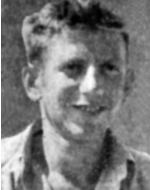Shapira, Yaakov (Yankele)
Son of Leah and Yitzhak, was born on February 2, 1962 in Vienna, the capital of Austria. Where he attended elementary and high school. In April 1939 he immigrated to Eretz Israel as part of Youth Aliyah, and for two years he was educated as a citizen of the Land of Israel. He called Fela and the local youth, and among the girls he found his girlfriend for his short life. He spent his third year of training in a group of shifts, and there, too, he stuck to the field of agriculture. He later joined the Hadassah group (Gezer). He was a member of the Haganah since his arrival in Israel. In June 1942, he volunteered for the British Army and was stationed in the Service Force. He advanced with the Water Supply Unit No. 405 (11) from Egypt to the vicinity of Tripoli, held responsible positions and, despite his opposition to rank and authority, reached the rank of sergeant. Served in a unit in Egypt and Libya until his release in 1946. During his service in the British Army he was active in organizing Aliyah Bet through Egypt and in purchasing weapons for the Hagana. In addition, he organized soldiers for settlement and when they returned to Israel they settled in Moshav Bnei Dror in Tel Mond. In his good qualities, he encouraged and encouraged his friends to safely pass the initial difficulties of the young moshav, in which he ran the branch and was a member of the economic committee and the secretariat. In the meantime, his daughter was born, but the obligation and affection for the family did not prevent him from fulfilling his duty to the homeland. Yaakov concentrated his security affairs in the area, and as commander of the Palmach in the area, he headed for a dangerous mission, unable to make do with a partial service, even though he was not required to do more, and in the winter of 1948 volunteered for full service in the Alexandroni Brigade. Was a platoon commander of recruits who had trained them to fight and his department had won a good name in the vicinity. After a harassing attack on the village of Tira (opposite the Tel Mond bloc), he returned time after time to bring wounded soldiers from the battlefield within a meter of the shots, and for the fourth time he was hit and fell while carrying a wounded soldier. On Wednesday, May 13, 1948, The declaration of the state was brought to eternal rest in the cemetery in Tel Mond, where he left a wife, Ruth, and a daughter.
